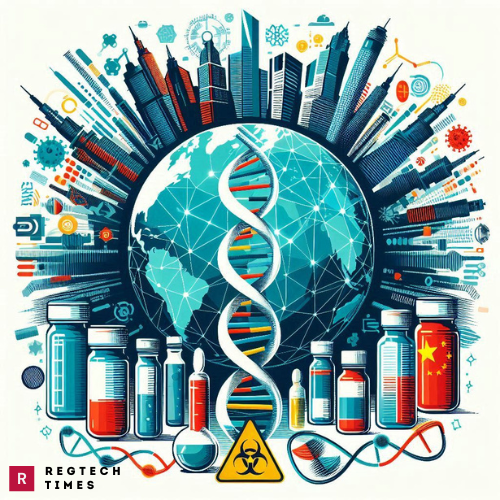As the global economy continues its recovery, the pharmaceutical industry is undergoing a period of rapid transformation. Strong national policies, cutting-edge technological advancements, expanding market demands, and aggressive globalization strategies are propelling China’s pharmaceutical industry forward at an unprecedented rate. Already the world’s second-largest medical market, China is playing an increasingly vital role in the global pharmaceutical supply chain, contributing everything from raw materials to advanced biotechnology research and development.
Yet, despite this impressive trajectory, the road to success is fraught with challenges. Domestically, China’s biopharmaceutical sector is dealing with increased scrutiny and anti-corruption campaigns, while on the international front, geopolitical pressures—particularly from the United States—are mounting. One of the most significant obstacles to date is the proposed Biosecure Act, which represents a new wave of sanctions aimed at China’s biopharmaceutical industry.
What Is the Biosecure Act?
The Biosecure Act, introduced in late 2023 and passed by the US House of Representatives in May 2024, aims to limit US government contracts with specific biopharmaceutical companies. This legislation builds upon earlier US actions targeting China’s technology and telecommunications industries, most notably the Defending US Government Communications Act. The stated purpose of the Biosecure Act is to protect US national security by restricting the involvement of foreign biotechnology firms deemed risky to the US biopharma supply chain.
Should the Senate approve the act, it would prohibit the US government and entities under its control from engaging in procurement with targeted Chinese biopharmaceutical companies. This would create significant hurdles for Chinese firms such as BGI Genomics and WuXi AppTec, two of the largest biotech companies that are reportedly on the list of affected firms. The impact, however, would be felt far beyond just government contracts. The legislation could also have wider-reaching implications for international cooperation, research, and investment in the sector.
Key Challenges for Chinese Pharmaceutical Companies
The Biosecure Act follows a familiar playbook of US sanctions, particularly those targeting China’s emerging technology sectors since 2018. In the case of biotechnology, the potential sanctions present several distinct challenges for Chinese firms.
Disrupted International Cooperation
If enacted, the Biosecure Act may severely hinder cooperation between Chinese pharmaceutical companies and foreign entities. As US regulations tighten, other nations might follow suit, complicating partnerships between Chinese firms and global research institutions. This could have a chilling effect on China’s ability to participate in joint R&D projects or global supply chains.Stricter Regulatory Scrutiny
Chinese firms identified under the Biosecure Act will face greater scrutiny, especially from US-based regulators. This includes stricter compliance reviews, disclosure requirements, and regulatory checks. As a result, companies might need to navigate a more complex web of regulations and compliance risks, limiting their ability to expand into new markets or maintain existing international operations.Restrictions on R&D and Technological Exchange
One of the most critical consequences of the act could be its restriction on research collaborations between Chinese companies and US institutions. By limiting joint research projects and technology exchanges, Chinese biopharma companies might find themselves isolated from important international scientific communities. This would not only slow innovation but also restrict access to cutting-edge research critical for future growth.The Wagner Group Escapes Sanctions and Continues Operations in Africa
Financing Challenges
The uncertainty caused by the Biosecure Act may lead foreign investors to reconsider their involvement in China’s pharmaceutical industry. The heightened political risk could reduce investor confidence, making it more difficult for Chinese firms to secure necessary financing. In an industry heavily reliant on foreign capital for R&D and market expansion, this could place additional pressure on companies that need to innovate continuously to stay competitive.Countermeasures: Turning Challenges into Opportunities
While the Biosecure Act introduces formidable challenges, it also presents opportunities for Chinese biopharma companies to pivot and innovate. To mitigate the risks posed by potential sanctions, these firms can adopt several strategic countermeasures.
Market Diversification
One key strategy for Chinese companies is to reduce their dependence on the US market by expanding into new territories. By targeting emerging markets in Asia, Africa, and Europe, Chinese biopharma firms can tap into new growth opportunities and spread out their risk.Enhancing Independent Innovation
To counteract limitations on international research cooperation, Chinese pharmaceutical companies should double down on their own R&D capabilities. Strengthening domestic innovation not only allows these firms to stay competitive but also reduces their reliance on foreign partners for critical technologies.Leveraging Government Support
China’s central government is actively encouraging its biopharma companies to “go global” by offering supportive policies and incentives. These programs can help firms strengthen their domestic supply chains, foster homegrown innovation, and equip them to handle international challenges more effectively.
As Chinese biopharmaceutical companies face mounting pressure from international sanctions, particularly through the Biosecure Act, they must adapt swiftly to safeguard their growth and innovation. The act poses serious challenges, from restricted market access to disrupted research collaborations. However, by focusing on market diversification, enhancing independent innovation, and leveraging policy support, these companies can turn adversity into opportunity and ensure their continued success on the global stage.
Ultimately, the Biosecure Act represents not just a hurdle but also a catalyst for change. How Chinese firms respond will determine their long-term competitiveness and their ability to remain key players in the global pharmaceutical landscape.


